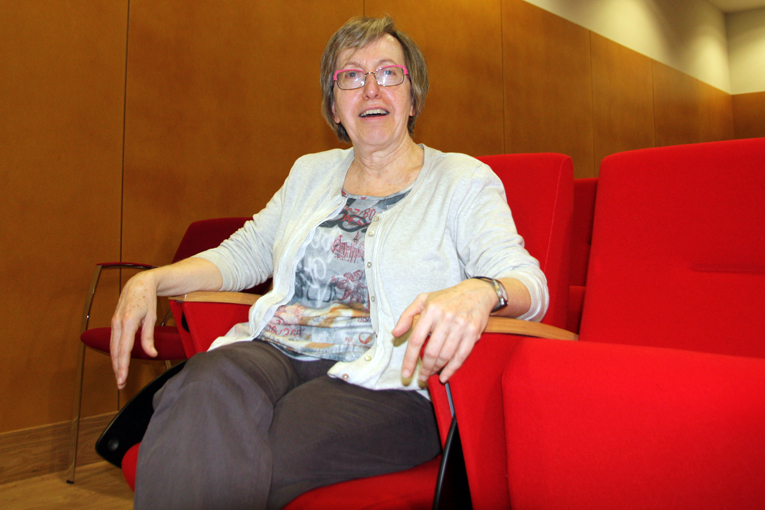|
Women are responsible for only between 12% and 15% of all relevant positions in Spanish universities. What is more, scientific areas are still vetoed for the female sex, who has been fighting for years for gender equality in universities. In Mètode‘s oncoming issue, you will find a monograph devoted to the analysis of the cause and effects of this conflict —Women and Science. Keys to Equality. We talked with Teresa Torns Martín, an expert in this area, about this topic.
Teresa Torns Martín, PhD in Sociology and member of the QUIT (Centre for Sociological Research on Everyday Life and Labour) at the UAB, has been studying the women’s role in science for years. She has combined the study of the challenges of the labour environment for women, with the study of the work-life balance and the lack of laws regarding paternity-leaves.
The Spanish law has undergone a series of reforms that have improved working conditions for women. Has it been of any use?
If there is a law it means that at least politicians are willing to improve the situation and that there is a budget to make this possible. Right now the situation is complicated because we are going through a terrible economic crisis and this means that things won’t improve in the short term. The working-women’s will is not to blame for the situation they are in, but the Spanish labour market is. Its organisation, production and services offered generate low-cost labour. And women get the worst of it, especially immigrant women. Science is another story… laws by themselves are not going to change reality. With the years I have learnt that laws guarantee that these changes can happen. If we want to change things but have no laws to appeal to, nothing can be done. However, nothing can be changed only by making laws.
You have also studied the work-life balance in working-women. It looks as if opening the professional sphere to women did not mean that domestic chores were equally divided. Did it mean that women had to overload themselves with work in and outside the home?
Yes, it did. The work-life balance model encouraged by the end of the 20th century was a strategy to promote women’s employment. They found that in Europe most married women who were also mothers and had children under twelve years of age or had more than three children either had part-time jobs or were out of the labour market. Then they thought that what they needed was more people working. Some even said that women would be better than immigrants since they were already here. Ever since the establishment of the Welfare State, most women got part-time jobs when they became mothers. However, in Spain this was not the case— part-time job contracts often have poor terms. You don’t get to reduce the amount of hours you work a day; you have to accept the terms offered or else you are out. What they offer is a twenty or thirty hour a week contract— if you are lucky— and continual changes in schedule. Nobody wants that. Work-life balance was thought of considering that women do not have to be working all day long— society will always think that women have to take care of their children. Work-life balance is alright if it applies to the whole working population— both women and men. And also because we can observe that, demographically speaking—as we can observe in the Spanish and other Southern European populations— the problem is not so much taking care of the children but of the elderly. And you can’t ask for a short-time contract in those conditions. Most women usually ask for an unpaid leave to face this kind of situation because they cannot do anything else. So, more than the work-life balance, what we should examine and change is the working day model, dividing the workload —including both paid and unpaid work— equally between men and women according to their needs.
Nowadays the model to look up to is a kind of Superwoman— a woman with an active professional life, who is in charge of the house and of course looks perfect all day long. Is it a kind of recognition of the women’s work or is it more about perpetuating the idea that women have to be able to handle everything whether they want to or not?
I think it has more to do with perpetuating this idea. It is a new trap that assigns every kind of house and family work to women. You are also expected to be more or less successful in your professional career and look perfect, as well as being ready to dance the «Dance of the Seven Veils». I say we have mistaken well-being with fitness. I am acquainted with many girls who don’t have the time to have lunch before going swimming.
|
|
«Work-life balance was thought of considering that women do not have to be working all day long— society will always think that women have to take care of their children»
|
|
Our monograph on women and science also talks about the role women play in universities nowadays. According to some studies, women are only responsible for 12% to 15% of all relevant positions in Spanish universities. What causes this imbalance?
Depending on the country, these figures reach the 15% or 16%; but in some other countries women only represent 11% of the total— this the situation in Germany and Belgium. This is so because in those countries the prestige that means working in universities is even higher than in Spain. So, since it is so important, there are more men working there. However, universities here welcomed masses of students very recently and therefore needed more professors. Many of these new professors were women. I was one of them.
And even so, are women aware enough of this situation?
No, they are not. Many young women are willing to carry out this kind of work, but they are unable. First of all they lack the time and spend their hours trying to do everything at once. Also, they are a little bit afraid of daring— if you talk about certain topics you may have to hear «What’s wrong with you? You are prettier when you keep quiet». Although boys also face this kind of challenge.
There are some imbalances nowadays that are completely outrageous. For instance, it is quite common that women get lower salaries for the same job. Is it that some still think that men’s time is more valuable than women’s?
Exactly, and that is completely unacceptable. But right now they are taking more measures than ever to fight against this situation and one of the most successful ones is the one that reviews occupational classifications. Thus, male classifications are not as highly paid, and there is an increase in the salary of women. These are also biased— women usually earn less because short-time jobs are more usual among them. But only in terms of salary, because our working hours exceed a man’s working hours. Use-of-time statistics show this. The women’s daily workload in Europe is higher than the men’s. Professionally speaking, women are less visible, though— unemployment is more spread among women and have more part-time jobs. When they make the calculations the outcome obviously is that salaries are lower. This is so also because women are not performing the better-paid jobs. We are overcrowding low-wage jobs.
AIn our monograph we talk about some scientific pioneers like Anna Freud or Mercedes Rodrigo. It is especially remarkable that all of them had to give up a personal life in order to succeed in their jobs. What do we have to learn from them?
Rita Levi Montalcini talks about this in her book— what we have to learn is that they fought. They were an example to us— they fought and made it but you have to be ready to pay the price. We have to fight to be able to handle everything, because allegedly men “have it all”. The mistake is to think that this claim is true. How can this be true of a man who can’t even make his own laundry…
It is unavoidable to talk about motherhood if we are talking about women and work-life balance. Nowadays it has become increasingly easier to become a mother thanks to technological progress. However, women have less time available since they spend most of their time in their professional careers. Will we ever achieve a real balance?
You are putting it wrongly. What we have to do is to incorporate fatherhood in the equation. Have children only got mothers? In Norway, for instance, you get a fourteen-week leave for your child’s birth— it does not risk your career and any business owner knows that both men and women will be absent to take care of the newborn. This change has been great. Why can’t we do that? What’s that about mothers wanting to have more time to be mothers? What I want are more fathers. Or two fathers or two mothers if that is the case. Regardless of the family model, both of them have to be there. The Danish ambassador claimed that in his country they respect it because they value the children and their right to be taken care of.
The crisis has worsened labour conditions for many people. Inequality is not only visible in women but also in young people. Do you think this will help to bring more visibility to the women’s unfair situation?
Young men are also having a hard time. That is a result of this crisis. Only with social sciences I can’t predict if these circumstances will improve women’s situation. It is going to be very challenging from the citizen’s point of view. Migration, for instance, is very hard because life is much more than enjoying professional success. The sooner we make them aware of this reality, the better.
Andrea González Garrigas. Student of Journalism at the University of Valencia.
© Mètode 2013.
|
|
«What’s that about mothers wanting to have more time to be mothers? What I want are more fathers. Or two fathers or two mothers if that is the case. Regardless of the family model, both of them have to be there»
|


 © Andrea González Garrigas
© Andrea González Garrigas




